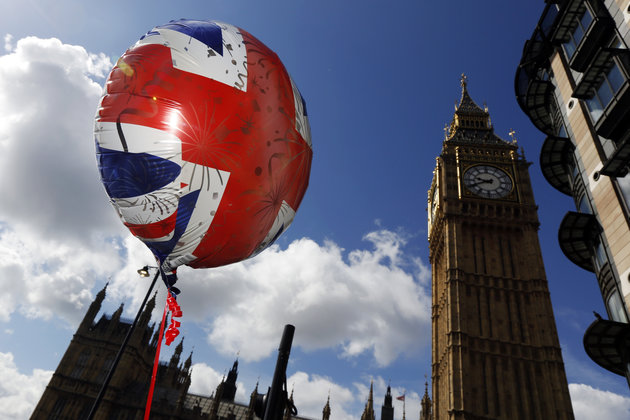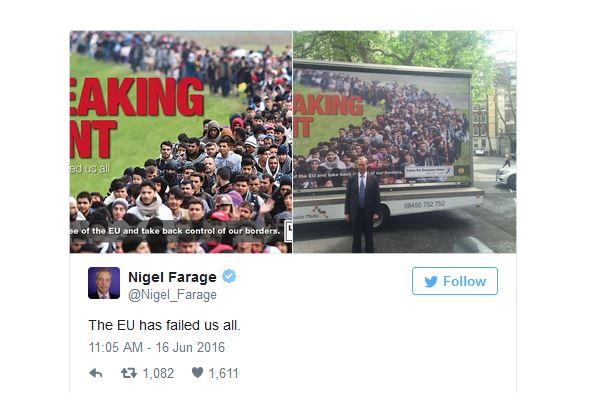Campaigning around Britain’s upcoming EU referendum resumed late Sunday after a brief suspension out of respect for Labour MP Jo Cox, who was tragically killed last Thursday in what appears to be in part a politically motivated attack.
Thomas Mair, the man accused in the murder of Cox, gave his name as “death to traitors, freedom for Britain” before a court on Saturday. Mair’s family said he had a history of mental illness. Both “Leave” and “Remain” supporters universally condemned the attack.
Cox’s death sent shock waves through Britain, casting a somber shadow on the country’s upcoming EU referendum on Thursday, and forcing harsh questions on the dark direction the Brexit debate has taken.
Mair’s comments specifically stoked concerns surrounding the dangers of rising anti-immigration rhetoric as the referendum draws nearer. Baroness Warsi, former chairman of the Conservative Party, made news on Monday when she cited an “environment of hate” within parts of the “Leave” camp as inspiration behind her decision to switch to “Remain.” Specifically, Warsi cited a controversial poster released by anti-EU UK Independence Party leader Nigel Farage last Thursday, which showed a large group of refugees walking through Slovenia and implied that Britain wouldn’t be able to control its borders as part of the EU. Politicians on both sides of the debate expressed deep concerns over the poster, criticizing its scare tactics and xenophobic message.
Amid investigations into the potential motives of Mair’s heinous crime and last-ditch efforts from pro- and anti-EU camps, the topic of immigration continues to be a defining factor in Britain’s referendum, with the vote just days away.
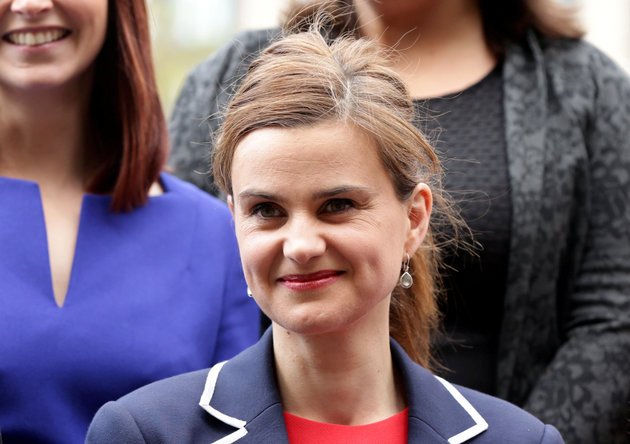
Labour MP Jo Cox was killed last Thursday in what is viewed as a politically motivated attack, leading to the brief suspension of all campaigning on both sides of the debate.
Photo: Yui Mok/Press Association/Handout via REUTERS
According to the most recent data from the Office for National Statistics, the U.K.’s net immigration rate is 333,000 per year, with 184,000 coming from within the EU. The country is also among the top four hosts of non-EU nationals in Europe, the International Organization for Migration says.
Public polls have found that 3-in-4 Brits say they favor reducing inward migration flows, and only 11 percent view EU immigration as having a positive impact on national life, spurring politicians on both sides of the debate to try to address the issue.
Eurosceptic politicians ranging from Conservative member Boris Johnson to UKIP’s Farage have attracted attention in part by vowing to dramatically reduce migratory flow post-Brexit. Prime Minister David Cameron, leading the “Remain” campaign effort, has rebuked these claims, calling such promises “madness.” In the face of nationwide pressure to address the influx of newcomers, he assured voters that immigration can be controlled from within the EU.
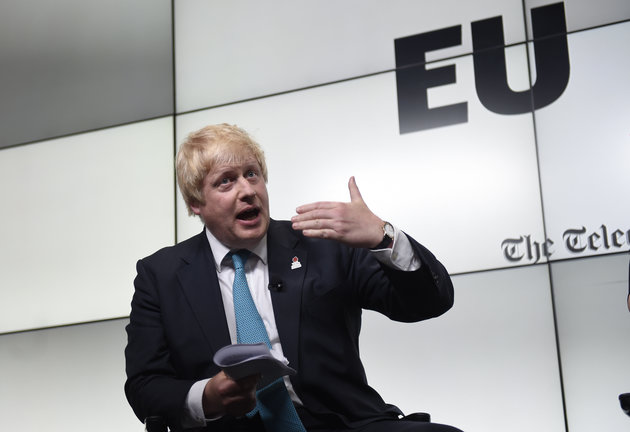
Former mayor of London and prominent pro-Brexit leader Boris Johnson said immigration has become a hot topic because voters feel they haven’t “given democratic consent to what is happening.”
Photo: DAVID ROSE/THE DAILY TELEGRAPH
The “Leave” Campaign And Immigration
Many prominent proponents of Britain leaving the EU have argued that it would help the country reduce its levels of immigration. Brexit supporters range from the hard-line conservative anti-immigration party UKIP, to a large part of the more moderate ruling Conservative Party.
Eurosceptic and Conservative employment minister Priti Patel argued Tuesday during a debate co-hosted by HuffPost UK that Britain is not fully in control of its immigration policies as a result of its EU membership — a view shared by many pro-Brexit Brits. A recent ORB/Telegraph poll of 800 voters revealed that 52 percent believed a Brexit would improve the U.K.’s immigration system.
Patel argued that free movement — one of the EU’s fundamental principles that enables its citizens to work and live in other member states without obtaining a work permit — has yielded a much higher number of immigrants in Britain than anticipated.
“The correlation between hostility to immigration and support for Brexit is high,” The Economist observed back in April, “so if [“Leave” campaigners] can turn the vote into one about migration, they will win.” Of late, Brexiteers have framed the topic as a key pillar of their platform, one they deem can best be addressed once outside of the EU.
“I think most people in this country feel that is very high indeed, and probably too high,” Johnson, the former mayor of London and a leading voice in the pro-Brexit movement, said Tuesday of Britain’s net immigration rate.
People feel that they haven’t given democratic consent to what is happening. Boris Johnson
Emphasizing the need for national control over policymaking, Johnson explained why he believes immigration has become such a hot topic.
“It’s control that matters, because there’s a reason why across Europe, you are seeing the rise of far-right parties,” he explained. “There’s a reason why you’re seeing immigration escalated in the whole conversation at the moment. And that is, I think, because people feel that they haven’t given democratic consent to what is happening.”
Farage, a controversial conservative and longtime critic of EU immigration laws, has directed harsh words at Cameron’s tireless “Remain” campaign and called the EU “not just bad for Britain” but “bad for the whole of Europe.” He suggested last year that the net immigration rate should be dramatically cut down to 30,000 newcomers annually, to restore Britain “to normality.” Yet when asked what would happen following a British departure from the EU, Farage admitted he had “absolutely no idea.”
Last Thursday, one week before the vote, the outspoken politician tweeted a photo showing the poster of a long line of migrants waiting to enter Europe, immediately garnering negative criticism on social media and stirring derision among many politicians on both sides of the issue.
Farage’s latest antics were part of a string of anti-immigration comments made by politicians ahead of this week’s momentous vote. They came on the heels of remarks by pro-Brexit Energy Minister Andrea Leadsom, who seemed to lament some newcomers’ inability to speak English in a recent interview with The Guardian.
“If you come here and you don’t speak English, and you don’t know the customs and you don’t know where to live and you don’t have a job, it’s really difficult for everybody. It’s really difficult to make you welcome,” she said, prompting some “Remain” advocates to denounce her comments as fuel for the nation’s widespread anti-immigration sentiment.
Cameron has also urged immigrants to learn English, saying it would give them greater access to opportunities without discrimination.
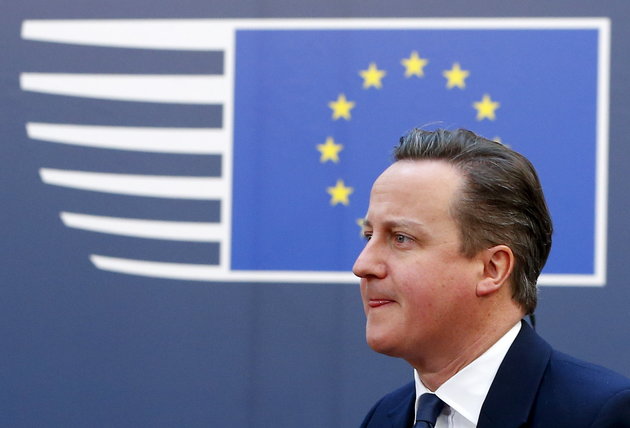
Spearheading the “Remain” campaign, Prime Minister David Cameron has assured voters that immigration can be managed from within the EU.
Photo: Yves Herman/Reuters
The “Remain” Campaign And Immigration
While those vying to leave the EU have asserted that the U.K.’s current immigration rates are unsustainable, taking a toll on the economy and threatening national security, British Chancellor George Osborne recently denied rumors of a pledge to cap EU immigration rates to appease voters ahead of the referendum.
Many EU backers like Labour Party MP Liz Kendall insist that immigrants bring greater benefit than burden to British society in the long run.
She attributed the oft-bemoaned pressures mounting on Britain’s health care system to government cuts and an aging population rather than immigrants, whom she described as “younger, healthier and of working age.”
Immigrants actually contribute a “huge amount” to the U.K., Kendall argued. “They do pay in more than they take out. Our [National Health Service] would struggle without the contribution that migrants make.”
Labour Party leader Jeremy Corbyn echoed Kendall’s sentiment at a recent speech in Yorkshire.
“Too many voices in this debate are only playing that old trick, the blame game,” he said, suggesting pro-Brexit politicians have scapegoated immigrants for national job insecurity and low wages. “Now they want to use people’s real concerns about the impact of EU migration to turn the campaign into a referendum on immigration.”
Former Scottish National Party leader Alex Salmond, a prominent voice in the anti-Brexit movement, highlighted the flip side of the immigration debate: the outward flow of migrants. Salmond expressed his belief that emigration is an equally if not more troubling problem facing Britain.
“I’ve seen emigration and depopulation, and believe me, it’s a lot worse, the problems it causes,” he warned.

Many EU backers fear a British departure from the EU would yield an uncertain economic future.
Photo: Jason Alden/Bloomberg via Getty Images
What We Know About Immigration To Britain And The Economy
While some British economists have warned of the consequences a sustained influx of migrants could have on Britain’s economy, studies including a 44-page report from the Bank of England, published in December and cited by politicians on both sides of the debate, show that the effects immigration rates have on labor wages overall are minimal.
Those in the semi- and unskilled services sector bear the brunt of immigration-related wage impacts, with “a 10 percentage point rise in the proportion of immigrants [being] associated with a 2 percent reduction in pay,” the study notes.
“Remain” supporters have also pointed to the many unknowns surrounding a post-Brexit economy. The Economist recently considered what the outcome might be if anti-immigration Brexiteers were to get their wish, and the sort of economic toll curbing immigration might introduce.
“Were Britain to impose tighter controls on EU migrants post-Brexit, growth would depend on attracting from elsewhere the skills its economy needs,” the London-based magazine concluded. “Yet it is politically unrealistic to believe that Britons who have just voted to leave the EU partly to curb uncontrolled migration from eastern Europe will want to welcome many more migrants from places like India and Africa.”
Looking beyond immigration to general concerns surrounding the economy, EU backers have pointed to the uncertainty that would cloud future trade deals should a Brexit occur, with U.S. President Barack Obama warning in April that leaving the EU would push the U.K. to the “back of the queue” in trade talks with America. Brexiteers have denounced his rhetoric as “threatening.”
“The president made clear that uncontrolled immigration into the EU is a threat to national security. I agree – that is why it is safer to take back control so that we can stop terror suspects from Europe coming into the UK,” retorted Conservative MP Dominic Raab. “He argued that he thinks it is in America’s interests for the U.K. to stay in the EU, but what is good for U.S. politicians is not necessarily good for the British people.”
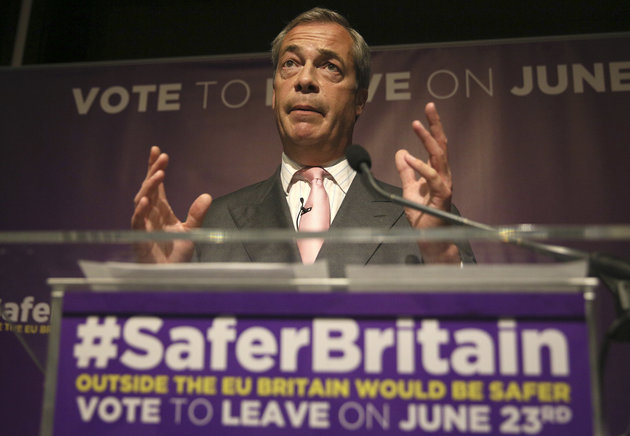
What We Know About Immigration To Britain And National Security
Just as the U.S. saw presumptive GOP presidential nominee Donald Trump exploit fear in the wake of the Orlando massacre to advance his immigration proposals, many in the U.K. like Salmond have accused the “Leave” supporters of falsely painting immigrants as dangerous and a threat to national security.
“I am fed up in this campaign seeing [immigrants] presented as a negative. It’s not fair, it’s not right, and it’s not true,” he snapped during Tuesday’s debate.
In late March the “Vote Leave” campaign, backed in varying degrees by Conservative Michael Gove as well as Raab, Patel and Johnson, published a list of convicted killers and rapists who were allowed to enter the U.K. from other EU states to highlight the purported dangers associated with free movement.
“Every EU citizen has a right to enter the U.K. under EU law. But EU law does not require other EU member states to inform the U.K. on a systematic basis of the criminal records of their nationals, creating an effective right of free movement for criminals,” the campaign notes in a statement on its website.
In fact, movement within the EU can be restricted “on grounds of public policy, public security or public health,” in circumstances that represent “a genuine, present and sufficiently serious threat” to society’s core interests, according to the Official Journal of the European Union’s citizenship directive outlines.
The U.K. has refused entry to more than 100,000 people since 2010, including over 6,500 EU nationals, a British immigration official told the BBC in April.
Praising the EU’s European Arrest Warrant, which was introduced to simplify law enforcement officials’ handling of cross-border crimes, Salmond concluded: “Cooperation on security matters between democracies is always a good thing to make all of us safer.”

